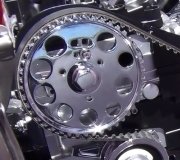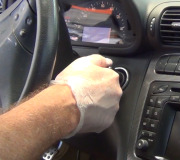There's two versions of your engine. There's a single camshaft engine and a dual camshaft engine. Both are "interference" engines meaning the valves will be damaged if the timing belt breaks. At the mileage you listed the timing belt should have been replaced once already to avoid the expensive valve repair, and it's about time for the second replacement.
The timing belt doesn't have to break for the valves to be damaged. It only has to jump a few teeth, then the pistons will hit and bend the open valves. This is actually a worse problem because the valves in every cylinder will be affected. If the belt breaks, the camshaft(s) will stop rotating right away so it is possible for a few of the valves to be spared as long as they remain not fully-open. It doesn't really matter because this reduced damaged, if it occurs, will only happen when the engine is running at very low speed, but your mechanic is not going to risk his time and your satisfaction by replacing just a few valves. He is going to replace all of them to insure the quality of the repair, and that the job doesn't have to be done over a second time.
Be aware too that if the timing belt has jumped just one or two teeth, the engine will be hard to start and will have seriously-reduced power. Also, no conscientious mechanic will replace a timing belt without replacing the tensioner and idler pulley, and the water pump if it is driven by the timing belt. Those things cause more timing belt problems than the belt itself. If one of them fails after the timing belt was replaced, the job will have to be done over again, and possible to include the expensive valve repair.
SPONSORED LINKS
Thursday, September 8th, 2016 AT 8:52 PM




